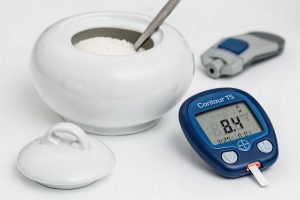As a dentist, I’m inclined to tell my patients to avoid eating sugar, but as a parent, I know that most products nowadays have some amount of sugar and it’s almost impossible to avoid. So, unless you have diabetes or a medical condition and are actively staying away from sugar, it’s difficult to continue living a regular lifestyle without consuming at least a little bit of sugar every day. That’s why I tell my patients instead to take sugar in moderation.
But at one point, I asked, how much sugar does that mean, exactly? For me, sugar in moderation means avoiding drinking sugary beverages and, at most, one or two donuts when someone brings donuts to the office. But what is “in moderation” for me may means something entirely different, and I’m not a dietician who can tell my patients that they should consume x grams of sugar. And it’s not like everyone checks the nutritional label of all the products they buy these days.
So, how much sugar is too much sugar?
Sugar in Our Diets: How Much is Okay?

What’s alarming is that our average sugar intake is two to three times the recommended sugar intake of the American Heart Association, which recommends 25 grams for women, 38 grams for men, and from 12 to 25 grams for children. This is in line with the World Health Organization’s recommendation, stating that sugar should amount for 10 percent of an adult’s daily caloric intake, which is also around 25 grams. However, this does not apply to people with
Why Are We Eating So Much Sugar?
Of course, some of you may already be thinking along the lines of, “This is only an average yearly consumption, but I’m an exception to the rule. I don’t consume that much sugar.” But unless you’re not eating out and actively avoiding sugar by reading every label of all the products you consume, then it’s highly likely that you are consuming sugar.

Apart from the fact that sugar is in a lot of the products we consume, there’s also the fact that sugar is highly addictive. Research looked into the eating habits of people who consumed sugar and found that it was similar to other highly addictive products such as drugs and alcohol. When people consume sugar, they crave sugar. If they don’t satisfy their cravings, they feel withdrawal symptoms.
Health Effects of Too Much Sugar
Break the recommended daily amount of sugar and you risk gaining health diseases from excessive sugar in your body. Too much sugar helps create a hormonal imbalance, which can be dangerous for certain bodily functions. For example, sugar creates glucose in the bloodstream, which leads the pancreas to create insulin. Not enough insulin and you could develop a diabetic condition.

Consuming too much sugar may also lead to heart disease, since sugar can spike your blood pressure while depositing fatty deposits clogging your arteries. A study with over 30,000 participants found that people who consumed more than the average amount of recommended sugar had a 38 percent greater risk of dying from heart disease.
Sugar may also negatively affect your mental health. Blood sugar swings and hormonal imbalance can affect one’s mental well-bring, including one’s serotonin, a hormone responsible for making you feel happy. When your hormones are imbalanced, your brain may think it is producing enough serotonin, when it is actually producing insufficient amounts of it.
A study that followed 8,000 men for 22 years found that men who consumed more sugar were almost 25 percent more likely to develop depression than men who consumed less. The same applied to a separate study of 69,000 women.
Overcoming a Sugar Addiction
If you seem to be consuming sugar on a daily basis and are actively looking for sugar-based food, you might already have an addiction to sugar. Remember, sugar affects our brain and body the same way drugs do when users become addicted to it. And since, unlike drugs, sugar and sugary products are very accessible, it’s easy for people to lose control and consume sugar regularly.

How much sugar is too much sugar? If you’re counting on the specifics, anything over around 25 grams a day is already too much. If you’re not the type of person who actively avoids sugar, I would recommend being cautious of the amount you consume in a day. Remember: everything in moderation. And thanks to organizations doing research on the effects of sugar, we know how much sugar “in moderation” means.
